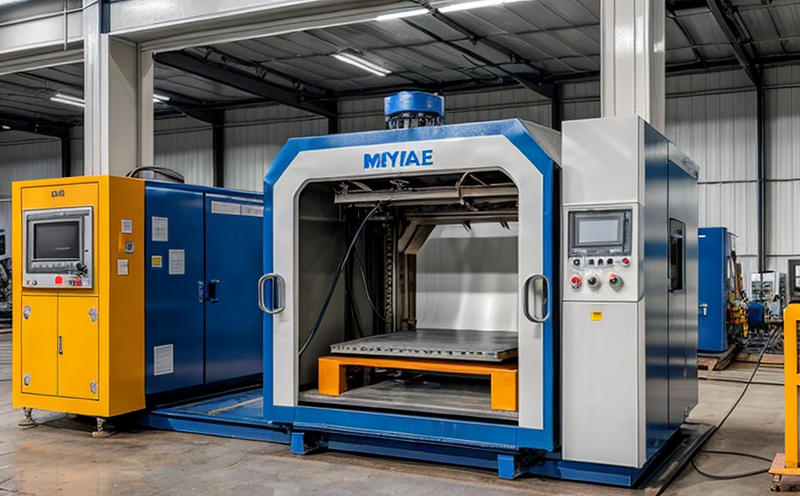Low-cycle fatigue testing for materials under stress
Unlocking the Secrets of Material Durability Low-Cycle Fatigue Testing for Materials under Stress
As businesses continue to push the boundaries of innovation and performance, material selection has become a critical component in ensuring product reliability and longevity. The demands placed on materials in modern applications can be extreme, with stresses and strains that would have been unimaginable just a few decades ago. In this environment, low-cycle fatigue testing for materials under stress becomes an indispensable tool for manufacturers seeking to optimize their products performance.
At Eurolab, our team of experts specializes in providing cutting-edge laboratory services tailored to meet the unique needs of modern industry. One such service is low-cycle fatigue testing, a rigorous and sophisticated technique designed to assess the durability of materials subjected to repeated stress cycles. By leveraging this advanced technology, businesses can gain invaluable insights into their products behavior under real-world conditions.
The Importance of Low-Cycle Fatigue Testing
Low-cycle fatigue testing for materials under stress involves subjecting specimens to repetitive loading and unloading cycles until failure occurs. This process provides a wealth of information about the materials capacity to withstand repeated stresses, enabling manufacturers to refine their product designs and materials selection processes. By understanding how their products respond to cyclic loading conditions, businesses can optimize performance, reduce downtime, and minimize warranty claims.
The benefits of low-cycle fatigue testing are far-reaching and multifaceted
Improved Product Reliability By simulating real-world operating conditions in the laboratory, Eurolabs experts can help manufacturers identify potential weaknesses and design improvements that increase product reliability.
Reduced Downtime Proactive material selection and design optimization enabled by low-cycle fatigue testing can minimize maintenance requirements and reduce downtime associated with premature failure.
Increased Efficiency By identifying areas for improvement, businesses can streamline production processes, optimize material usage, and enhance overall operational efficiency.
Enhanced Customer Satisfaction Products that perform consistently under stress demonstrate a commitment to quality and customer satisfaction, which is essential in todays competitive market.
Key Benefits of Low-Cycle Fatigue Testing
Our low-cycle fatigue testing services offer numerous advantages for businesses seeking to optimize their product performance
Rapid Testing Times Eurolabs state-of-the-art facilities enable rapid testing times, allowing manufacturers to quickly evaluate material performance and make informed design decisions.
Highly Accurate Results Our team of experts ensures that every test is conducted with the utmost precision, providing reliable results that accurately reflect real-world operating conditions.
Flexibility and Customization We offer flexible testing protocols tailored to meet specific business needs, ensuring that our services remain responsive to industry demands.
Comprehensive Reporting Detailed reports outlining test results, material properties, and recommendations for improvement enable manufacturers to make informed design decisions.
QA Understanding Low-Cycle Fatigue Testing
To provide a deeper understanding of low-cycle fatigue testing for materials under stress, weve compiled the following frequently asked questions
Q What is low-cycle fatigue testing?
A Low-cycle fatigue testing involves subjecting specimens to repetitive loading and unloading cycles until failure occurs. This process provides valuable insights into material durability.
Q Why is low-cycle fatigue testing essential for businesses?
A By simulating real-world operating conditions, low-cycle fatigue testing enables manufacturers to identify potential weaknesses, optimize product designs, and enhance overall performance.
Q What types of materials can be tested using low-cycle fatigue testing?
A Eurolabs experts specialize in testing a wide range of materials, including metals, alloys, polymers, and composites.
Q How long does low-cycle fatigue testing take?
A Testing times vary depending on the specific requirements of each project. Our team will work closely with clients to determine the most efficient testing protocol.
Q Can I get results in real-time or near-real time?
A Yes! Our state-of-the-art facilities enable rapid data acquisition and analysis, allowing for timely delivery of test results.
Conclusion
Low-cycle fatigue testing for materials under stress is an indispensable tool in todays fast-paced industry. By leveraging this advanced technology, businesses can unlock the secrets of material durability, refine their product designs, and optimize performance. At Eurolab, our team of experts is dedicated to providing cutting-edge laboratory services tailored to meet the unique needs of modern industry. Whether youre seeking to improve product reliability, reduce downtime, or enhance customer satisfaction, we invite you to explore the benefits of low-cycle fatigue testing for materials under stress.
By choosing Eurolabs low-cycle fatigue testing services, businesses can
Enhance product performance and lifespan
Reduce maintenance requirements and associated costs
Increase operational efficiency and productivity
Demonstrate a commitment to quality and customer satisfaction
In an industry driven by innovation and performance, Eurolab is proud to offer this advanced laboratory service, empowering manufacturers to take their products to the next level. Contact us today to learn more about how low-cycle fatigue testing can transform your business.




